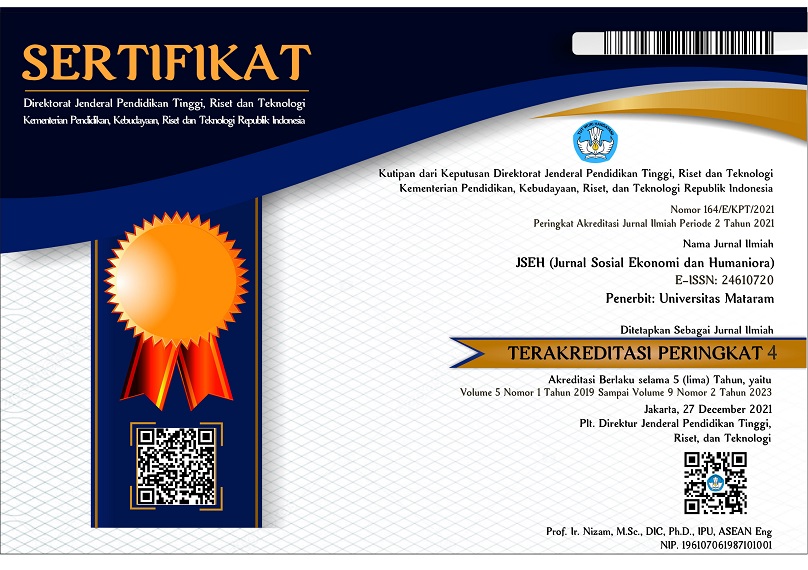Youth Interest in Korean Culture (K-Pop) and its Impact on Indonesian Nationalism
DOI:
https://doi.org/10.29303/jseh.v9i2.345Keywords:
Korean Culture, Lifestyle, NationalismAbstract
Korean culture, becoming popular in Indonesia, has impacted its lovers. In addition, the media also plays a role in causing the emergence of Korean fever in society. Korean culture and style have become popular culture, not only about music; many people also like dramas or films related to Korean culture. This development began to affect the public, especially Civics Education students at the University of Mataram. This research was conducted to explain the impact of Korean culture on the level of nationalism of youth interested in Korean culture. The results illustrate that young people are willing to spend special funds to adopt Korean cultural styles by following fashion and collecting items related to their idols from Korea. Even so, youth admit that nationalizing Indonesia remains the first choice. Being interested in Korean culture is part of the fun. It did not affect his love for Indonesian nationalism.
References
Agustin, D S Y. 2011. “Penurunan Rasa Cinta Budaya Dan Nasionalisme Generasi Muda Akibat Globalisasi.” Jurnal Sosial Humaniora 4 (2): 177–85.
Angelicha, T. 2020. “Dampak Kegemaran Menonton Tayangan Drama Korea Terhadap Perilaku Remaja.” Journal of Education, Psychology, and Counseling 2 (1): 154–59.
Astika, S, E Herianto, S Sawaludin, and L Sumardi. 2023. “Pengaruh Implementasi E-Learning Berbasis Quizizz Terhadap Hasil Belajar PPKn.” Jurnal Ilmiah Profesi Pendidikan 8 (1): 154–60.
Aufa, AA, M Mufid, and FRR Wahdani. 2022. “Pengaruh Budaya Populer Korea Terhadap Perilaku Modeling Siswa Madrasah Aliyah Negeri.” Scaffolding: Jurnal Pendidikan Islam Dan Multikulturalisme 4 (2): 304–20.
Gumelar, S. A, R Almaida, and AA Laksmiwati. 2021. “Dinamika Psikologis Fangirl K-Pop.” Jurnal Cognicia 9 (1): 17–24.
Herianto, E. 2013. “E-Learning, Implementasi Teknologi Di Era Belajar: Kajian Pada Mata Kuliah Kurikulum PKN Di Jurusan PIPS FKIP Universitas Mataram.” Jurnal Pendidikan Dan Pembelajaran 20 (1): 1–8.
———. 2017. “The Effect of Learning Strategy, Achievement Motivation, and Communication Skill Toward Learning Outcomes on the Course PMPIPS-SD at PGSD.” International Research Journal of Management, IT & Social Sciences 4 (5): 1–11.
———. 2022. “Strengthening Discipline Character & Student Learning Outcomes through Implementation of Portfolio Assignments in E-Learning.” Jurnal Pendidikan: Teori, Penelitian, Dan Pengembangan 7 (1): 21–27.
———. 2023. Implementation of HOTS-Based Learning in Higher Education. Proceedings of the Annual Conference on Research, Educational Implementation, Social Studies, and History (AREISSH 2021). Atlantis Press SARL.
Herianto, E, D Dahlan, B Al-Qodri, and R N Setyowati. 2021. “Character Education Development Model Based on Local Wisdom in Schools and Madrasahs.” Jurnal Sosial Ekonomi Dan Humaniora 7 (1): 1–7.
Herianto, E, M Jahiban, and D Dahlan. 2020. “Pola Perlindungan Anak Dalam Dimensi Sekolah Ramah Anak Di Sekolah/Madrasah Kota Mataram.” Jurnal Sosial Ekonomi Dan Humaniora 6 (2): 179–91.
Ikrom, Z, and Others. 2022. Mengenal Lebih Dalam Komunikasi Lintas Budaya Di Era 5.0 (Pengaruh Budaya Asing Terhadap Pola Komunikasi Antarbudaya Serta Gaya Hidup Masyarakat Di Indonesia ). Sumatera Barat: Penerbit Insan Cendekia Mandiri.
Ilham, M, R Wati, A Fauzan, and E Herianto. 2022. “Pengaruh Model Blended Learning Terhadap Motivasi Belajar Siswa Kelas VII Pada Mata Pelajaran PPKn Di SMP Negeri 9 Mataram.” Jurnal Pendidikan Kewarganegaraan 6 (2): 179–92.
Ismiati, YH, E Herianto, B Alqadri, and M Zubair. 2022. “Pelaksanaan Pembelajaran E-Learning Berbasis Web Pada Mata Pelajaran PPKn Di SMK Negeri 3 Mataram.” PALAPA 10 (2): 292–303.
Kusumawardani, A, and Faturochman. 2004. “Nasionalisme.” Buletin Psikologi, 2004.
Praundrianagari, SB, and H Cahyono. 2021. “Pola Konsumsi Mahasiswa K-Popers Yang Berhubungan Dengan Gaya Hidup K-Pop Mahasiswa Surabaya.” INDEPENDENT: Journal Of Economics 1 (2): 33–40.
Rahmah, N, M Zubair, and B Alqadri. 2022. “Persepsi Masyarakat Tentang Radikalisme Agama (Studi Di Kecamatan Mpunda Kota Bima).” PALAPA1 10 (2): 264–77.
Ri’aeni, I, M Suci, M Pertiwi, and T Sugiarti. 2019. “Pengaruh Budaya Korea (K-Pop) Terhadap Remaja Di Kota Cirebon.” Communications 1 (1): 1–25.
Sandra, L. 2012. “Dinamika Psikologis: Interaksi Konsep Diri Dan Identitas Online.” Yogyakarta: Universitas Gadjah Mada.
Yang, J. 2012. “The Korean Wave (Hallyu) in East Asia: A Comparison of Chinese, Japanese, and Taiwanese Audiences Who Watch Korean TV Dramas.” Development and Society 41 (1): 103–47.
Zubair, M, M Ismail, and B Alqadri. 2019. “Rekonstruksi Nilai Pancasila Dengan Pendekatan Local Wisdom Masyarakat Sasak Sebagai Upaya Penyelamatan Identitas Nasional Melalui Mata Kuliah Kewarganegaraan Di Universitas Mataram (Studi Deskriptif Di Nusa Tenggara Barat).” Jurnal Ilmiah Pena: Sains Dan Ilmu Pendidikan 11 (2): 1–8.
Downloads
Published
How to Cite
Issue
Section
License
Copyright (c) 2023 Wasilatul Aslamiyah, Edy Herianto, Bagdawansyah Alqodri

This work is licensed under a Creative Commons Attribution-NonCommercial 4.0 International License.








